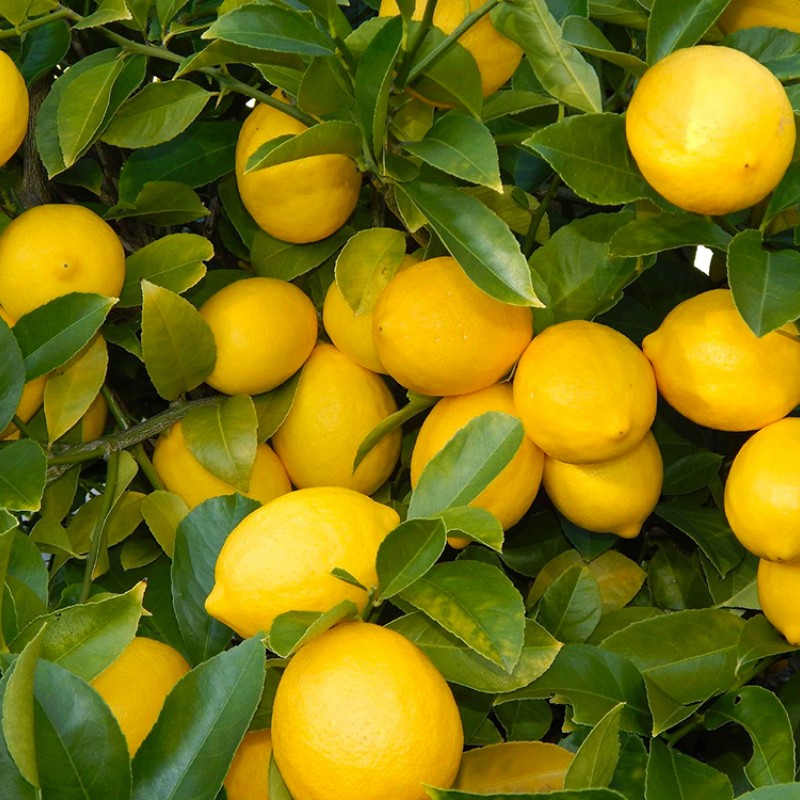Out Of Stock

The Meyer lemon tree is a natural hybrid of three separate species - the pomelo, mandarin, and lemon - and is native to China. It has a number of characteristics that point to a lemon origin, such as lemon-scented leaves, serrated leaf margins, reddish new shoots, and purple-colored flowers. However, the fruit itself has characteristics that suggest the Meyer lemon may also be a hybrid with a sweet orange. The fruits are known for their sweeter, less acidic taste than traditional lemons. Citrus Meyeri is more resistant to cold temperatures than classic true non-hybrid lemon trees, making it a great option for growers in cooler regions.
Origin: discovered in China in 1908 by the agricultural explorer and plant collector Frank Nicholas Meyer. Though it is given his name, this variety was likely established thousands of years before he introduced it to the United States.
Crossing scheme: ((pomelo x mandarin) x lemon), in latin ((Citrus maxima x Citrus reticulata) x Citrus limon)
Vigour: moderate. Mature trees are compact, small, around 2 to 3 m tall with dark green shiny evergreen leaves. It can be propagated either by grafting onto a rootstock but also grows well on its own roots.
Rootstock: Meyer lemon trees are frequently grown on their own roots, making grafting unnecessary. However, when grafted, the most common rootstocks used are Trifoliate Orange (Poncirus trifoliata), known for its vigor and resistance to root rot, or cultivar of Poncirus trifoliata Flying Dragon, favored for its dwarf size and cold hardiness.
Blossom: self-fertile. Typically flower multiple times a year, but their main flowering periods are in the spring and fall. The flowers are white with a purple base and fragrant.
Fruits: the fruit is rounder and smaller than a true lemon. Meyer lemon weighs around 30-60 g. The fruit initially turns yellow when ripe, but then changes color to deep golden-yellow with a slight orange tint. The rind is fragrant, thin, edible and has a citrusy, bergamot flavor with less bitterness than regular lemon rind.
Flesh: deep yellow to light orange, juicy with a good lemon flavor and contains up to 10 seeds per fruit
Flavor: Meyer lemon fruits have a sweeter, more floral and less acidic flavor than the more common lemon varieties. They are a favorite among chefs and home cooks alike for their versatility in both savory and sweet dishes. It is used often to season fish and seafood.
Harvest season: remontant tree, bearing fruit year-round but mostly in winter. Bearing age 3-4 years after planting.
Yield: prolific fruit production
Disease resistance: relatively pest-free and disease-resistant. If pests, such as aphids, whiteflies, rust mites, mealybugs, or scale occur, use an organic neem oil NeemAzal.
Frost resistance: more resistant to cold than classic true non-hybrid lemon trees, it is very adaptable to the environment and thanks to this it is extremely suitable for apartments. If damaged by frost, it can recover quickly.
Planting and care: the Meyer lemon tree is popular as an ornamental plant for its compact size, hardiness, and productivity. It is decorative and suitable for container growing. Choose a sunny spot (6-8 hours of sunlight per day) with well-draining soil. Use a loamy, sandy mix with a pH between 5.5 and 6.5. Keep the soil consistently moist but not soggy, avoiding overwatering. Feed with a citrus-specific fertilizer during the growing season. Prune regularly to maintain shape, improve airflow, and encourage fruit production. If grown outdoors, protect trees from frost by moving them indoors or covering with a fleece bags for tropical and citrus plants.